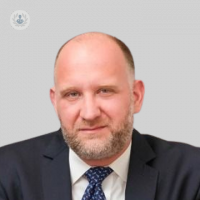Exploring the latest treatments for erectile dysfunction: A doctor’s perspective
Written in association with:Erectile dysfunction (ED) is a common condition affecting men of all ages, particularly as they get older. It can significantly impact quality of life and self-esteem. Advances in medical science have introduced a range of treatments that offer hope and effective solutions. From lifestyle changes to cutting-edge therapies, understanding the available options is vital for improving outcomes.

What causes erectile dysfunction?
Erectile dysfunction occurs when there is difficulty achieving or maintaining an erection firm enough for sexual activity. Common causes include:
- Physical factors: Cardiovascular disease, diabetes, obesity and hormonal imbalances.
- Psychological factors: Stress, anxiety, depression or relationship issues.
- Lifestyle factors: Smoking, excessive alcohol consumption and a sedentary lifestyle.
A thorough medical assessment is essential to identify the underlying cause and guide treatment.
First-line treatments for ED
- Lifestyle modifications:
- Adopting a healthier lifestyle, such as regular exercise, weight management, and a balanced diet, can improve vascular health and erectile function.
- Quitting smoking and reducing alcohol intake are also crucial.
- Oral medications:
- PDE5 inhibitors: Medications like sildenafil (Viagra), tadalafil (Cialis), and vardenafil (Levitra) enhance blood flow to the penis, making it easier to achieve an erection. These are effective for most men but require sexual stimulation to work.
- Side effects may include headaches, flushing or indigestion.
Cutting-edge treatments
- Low-intensity shockwave therapy (LiSWT):
- This non-invasive treatment uses sound waves to improve blood flow and promote tissue regeneration in the penile area.
- It is particularly promising for men with mild to moderate ED caused by vascular issues.
- Platelet-rich plasma (PRP) therapy:
- PRP involves injecting a patient’s own plasma, enriched with growth factors, into the penile tissues.
- This therapy aims to repair damaged tissues and enhance erectile function, with several studies showing a definite improvement.
- Testosterone replacement therapy (TRT):
- For men with low testosterone levels, TRT can improve libido and erectile function.
- It is available in various forms, including injections, gels, and patches, but requires careful monitoring by a doctor.
- Vacuum erection devices (VEDs):
- A non-invasive option that uses a vacuum pump to draw blood into the penis, creating an erection.
- A constriction ring is placed at the base of the penis to maintain the erection during intercourse.
Advanced medical and surgical options
- Penile injections: Medications like alprostadil can be injected directly into the penis to induce an erection.
- Urethral suppositories: Alprostadil may also be administered via a small pellet inserted into the urethra.
- Penile implants:
- For men who do not respond to other treatments, surgically implanted devices can provide reliable results.
- Implants are available in inflatable or semi-rigid forms and are customised to suit the patient’s needs.
Psychological support and counselling
Since psychological factors often contribute to ED, addressing mental health is an essential part of treatment. Options include:
- Cognitive behavioural therapy (CBT): To manage anxiety or performance-related concerns.
- Couples therapy: To improve communication and address relationship issues.
The importance of consulting a specialist
Seeking help from a urologist or sexual health specialist is critical for tailored treatment. They can perform tests, such as hormone level assessments or vascular evaluations, to determine the most suitable therapy.
By exploring the latest treatments and addressing underlying causes, men can regain confidence and enjoy an improved quality of life. Consulting a medical expert is the first step toward effective management and long-term solutions for erectile dysfunction.


